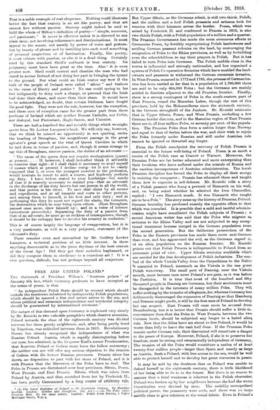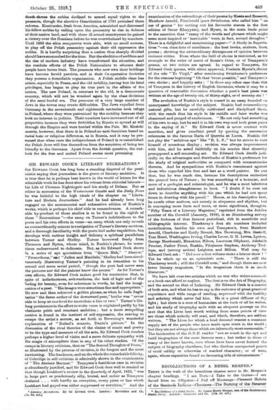FREE AND UNITED POLAND.• THE thirteenth of President Wilson's "
fourteen points " of January 8th last, which Germany professes to have accepted as the berms of peace, is that An independent Polish State should be erected which should include the territories inhabited by indisputably Polish populations, which should be assured a free and secure access to the sea, and whose political and eoonomio independence and territorial integrity should be guaranteed by international covenant."
The nature of this demand upon Germany is explained very clearly by Mr. Kozicki in two valuable pamphlets which deserve attention. Poland towards the close of the eighteenth century was divided between her three greedy neighbours, and, after being partly freed by Napoleon, was redivided between them in 1815. Revolutionary Russia has already recognized the independence of what was Russian Poland. Austria, which is rapidly disintegrating before our eyes, has admitted, in the Emperor Karl's recent Proclamation, that Austrian Poland or Galicia must have the fullest autonomy ; she neither can nor will offer any serious objection to the reunion of Galioia with the former Russian provinces. Prussia alone has shown no disposition to part with her share of Poland, and it is with Prussia that the liberators of the Poles have to deal. The Poles in Prussia are distributed over four provinces, Silesia, Posen, West Prussia, and East Prussia. Silesia, which was taken from Poland by Austria, and then snatched from her by Frederick II., has been partly Gezenanized by a long course of arbitrary rule.
• (1) The Social 1,uiuden of I'oland in the Nineteenth Century. By Btanislas Kortoki. Loudon : Hodder and stoughton. [6d. net.)—(2) The Poke unite, Precision Rule. By the same anther. London : Polish Press Bureau, 1 Upper Montague tercet, W.0.1.
But Upper Silesia, as the Germans admit, is still two-thirds Polish, and the million and a half Polish peasants and artisans look for reunion with their kinsmen across the border. Posen, which was seized by Frederick U. and confirmed to Prussia in 1815, is also two-thirds Polish, with a PolishpopulatMn of a million anda quarter. The Prussian Government has made the most strenuous efforts to Germanize Posen, by forcibly expropriating Polish landowners and settling German peasant colonies on the land, by encouraging the emigration of Poles to the Rhine provinces, as well as by forbidding even the schoolchildren to say their prayers in Polish. But it has failed to turn Poles into Germans. The Polish middle class in the towns is influential and strongly nationalist, and has organized a system of Polish Co-operative Societies which have enabled the land- owners and peasants to withstand the German eoonomio invasion. In West Prussia, annexed in 1772 and 1793, the process of Germaniza- tion has been carried so far that in a population of 1,700,000 there are said to be only 604,000 Poles ; but the Germans are mainly settled in districts adjacent to the old Prussian frontier. Finally, there is a strong contingent of Poles in the south-eastern part of East Prussia, round the Masurian Lakes, though the rest of this province, held by the Hohenzollern since the sixteenth century, is the German stronghold of the Junkers. Mr. Kozioki estimates that in Upper Silesia, Posen, and West Prussia, excluding a few German border districts, and in the Maeurian region of East Prussia there are in all four million Poles, or seventy per cent. of the popula- tion. The Prussian Poles thus form a nation larger than Norway and equal to that of Serbia before the war, and their wish to rejoin the Poles formerly under Russian and still under Austrian rule cannot be ignored or thwarted any longer.
From the Polish standpoint the recovery of Polish Prussia ie essential to the future well-being of Poland. Posen is as much a centre of the Polish race as Cracow or Warsaw. Moreover, the Prussian Poles are far better educated and more enterprising than their brethren who have suffered under the misrule of Russia and the careless incompetence of Austrian administration. The harsh Prussian discipline has forced the Poles to display all their energy In resisting the conqueror ; Prussia has eduoated them and taught them how to organize in self-defence. Mr. Kozioki tells a story of a Polish peasant who hung a portrait of Bismarck on his wall, and, on being asked whether he admired the Iron Chancellor, replied : " I owe Bismarck much. It was Bismarck who taught rile to be a Pole." The story sums up the history of Prussian Poland. German brutality has produced exactly the opposite effect to that which was intended. It is possible that a mild and taotful adminis- tration might have conciliated the Polish subjects of Prussia ; a recent American writer has said that the Poles who migrate as -artisans to the Rhine Valley and are not subjected to any excep- tional treatment beoome merged in the German population from the second generation. But the deliberate persecution of the Poles in the Eastern provinces has made them more anti-German than ever, and has aggravated the evil, as the Germans regard it, of an alien population on the Russian frontier. Mr. Kozioki points out that Polish Prussia is indispensable to Poland from an economic point of view. Upper Silesia contains ooalfields which are needed for the free development of Polish industries. The con- trol of the whole Vistula Valley from the Carpathians to the Bahia le essential to Poland, inasmuch as the Vistula is the one great Polish waterway. The small port of Dantzig, near the Vistula mouth, must become once more Poland's sea-gate, as it was before the Partition. It is true that most of the hundred and fifty thousand people in Dantzig are Germans, but their sentiments must he disregarded in the interests of many million Poles. They will suffer nothing by the transfer of allegiance,for, whereas Germany has deliberately discouraged the expansion of Dantzig so that Hamburg and Bremen might profit, it will be the first ears of Poland to develop her one seaport. East Prussia will once more be severed from Brandenburg, but it Is better that Prussia should suffer a little in_ convenience than-that the Poles in West Prussia, between the two German lands, should be subjected any longer to a hated alicz rule. Now that the Allies have sat about to free Poland, it would be worse than folly to leave the task half done. If the Prussian Poles remain under German rule, their discontent will constitute a danger to the peace of Europe. Moreover, Poland, if she is to preserve her freedom, must be strong and economically independent of Germany, The reunion of all the Poles would constitute a nation of at least twenty-four million people—larger than Spain and nearly as large as Austria. Such a Poland, with free access to the sea, would be well able to protect herself and to develop her great resources in peace.
It may be said by the doubters that as Poland was unable to defend herself in the eighteenth century, there is little likelihood of her being able to do so in the future. But there is nw reason to assume that a fatal weakness is inherent in the Polish character. Poland was broken up by her neighbours because she had the worst Constitution ever devised by man. The nobility monopolized political power, the peasantry were serfs, and there was no large • middle class to give cohesion to the social fabric. Even in Poland's death-throes the nobles declined to accord equal • rights to the peasants, though the abortive Constitution of 1791 promised them reforms. Kosciuszko, fresh from Amerioa, astonished and distressed his fellow-nobles by calling upon the peasantry to rise in defenoe of their native land, and with these ill-armed countrymen he gained a victory over the Russians before he was overwhelmed by numbers. Until 1863 the alien conquerors were able, with no small Burmese, to play off the Polish peasantry against their old oppressors the nobles. It is hardly surprising that a nation thus sharply divided should have suooumbedfor the time But the abolition of serfdom and the rise of modern industry have transformed the situation, and the resolute efforts of the Polish Nationalists to educate their people have borne fruit. The peasants who now own their holdings have become fervid patriots, and in their Co-operative Societies they possess a formidable organization. A Polish middle class has arisen, especially in Posen, and the old nobility, having lost its fatal privileges, has begun to play its true part in the affairs of the nation. The new Poland, in contrast to the old, is a democratic country, which will not be wrecked again by the class divisions of the semi-feudal era. The presence of a very large number of Jews in the- towns may create diffiaulties. The Jews expelled from Germany in the seventeenth and eighteenth centuries took refuge in Poland;where they were 'patronized by the nobility because they took no interest in polities. Their numbers have inoreased out of all proportion because they were forbidden by Russia to spread at will through the Empire and were herded within the Pale. Mr. Kozioki asserts, however, that there is in Poland no anti-Semitism based on racial hate or religious difference, as in Russia, and it may be pre- sumed that when once the independenee of Poland is reestablished the Polish Jews will free themselves from the suspicion of being too friendly to the Germans. Apart from the Jewish question, the out- look for the free and united Poland seems most promising.



































 Previous page
Previous page